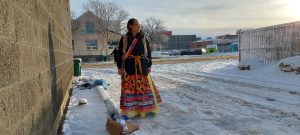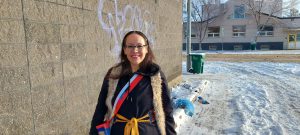Michelle’s Story About Overcoming Poverty
This is Michelle. She grew up in Edmonton. Whenever Michelle returns to Edmonton, she sits on the curb next to Bissell Centre’s community space. “This is where she sat,” Michelle says. “And I feel like she’s still here. I tell her that I love her whenever I sit here.”
Michelle’s mom regularly visited Bissell Centre, requiring services from drop-in supports to the housing program. “My mom was a residential school survivor, she became addicted to alcohol and drugs over the years. She was the most loving, kind mom before that.”
She sits on the curb, lights the sage in a small cast iron skillet and places her headphones into her ears. She takes a long breath and starts talking to her mom about overcoming poverty. She tells her how she’s taking care of the babies, getting her degree, and working in corporate now – that she’s doing really good.
When Michelle says she’s doing really good, this carries a very heavy weight. This means she’s helping her children heal, providing for her family, and moving forward away from the cycle of poverty she knew. She’s breaking Intergenerational trauma and overcoming systemic oppression. And she’s able to give back.
Another breath and she begins singing. Not starting with a whisper, but right from the bottom of her feet, out her mouth, and reverberating across 96 Street. Wandering up and down the alleyway where her mother passed away, she releases every emotion in her being with every word she sings.
Where Michelle is today
Today, Michelle is a social worker with a background in childcare and Indigenous culture. She now lives in central Alberta. She is part of an Alberta Health Services advisory council, where she regularly attends meetings to help offer better services to all Albertans.
Overcoming poverty was not an easy path. Growing up in poverty and with parents experiencing addiction meant she had to work four times as hard to get where she is today. Michelle was able to find a path that was healthier and more fulfilling for her and her family.
Michelle’s Journey to Bissell
As a child, Michelle (along with her mother and three siblings) left their northern Alberta community to escape toxic family dynamics and domestic violence. The family travelled to Edmonton for a better life. But both of her parents quickly experienced addictions, and it wasn’t long before Michelle’s mother found herself living in Edmonton without shelter.
After she became a parent, Michelle came to Bissell Centre for some basic needs, the child care program, and the parent program. This is where she met childcare worker Fatima and family supports worker Cheryl. Michelle felt honoured that these women heard her story and believed she could one day leave poverty behind – once and for all. It was the first time Michelle felt like her support was nonjudgmental, encouraging, and believed in her goals.
“Being an Indigenous woman, in my experience, was being told to be quiet a lot,” Michelle says. She points out how Bissell’s service delivery approach helped her heal from her trauma. “Many programs [from other service providers] would often parent or monitor my life. Bissell treated me like a person. They gave me wings to fly.”
Michelle and her siblings each had their own challenges with poverty and addiction as they grew into adults. Though Michelle overcame her challenges, much of her family succumbed to their challenges. She honours her only brother’s death in 2015, her youngest sister’s death from COVID in 2022, and her sister-in-law’s death that same year. By 2016, her mother’s life would be cut short by complications due to pneumonia.

Michelle’s Giving Back
Speaking from her experiences, Michelle thinks trauma is often not openly spoken about. She did not have access to many role models speaking eloquently about the realities of being Indigenous. She’s learning to manage her trauma through post-secondary education, her art, her work as a facilitator, and being a two-spirited leader. She is a strong Indigenous mother teaching her children about their culture, history, customs, and their connections back to the land.
After she finished her ceremony, she walked around the corner to the folks standing in line at the Community Space. Michelle spots an elderly Indigenous woman and gifts her the tobacco. She hears about how her new friend just found her new place to call home. The tobacco will hang in the new home – Michelle’s gift as an act of healing.
Michelle comes back, smiling wide as she cleans from her own healing ritual. She tells us how happy she is for her new friends. “They’re doing really good!”


